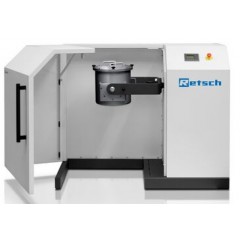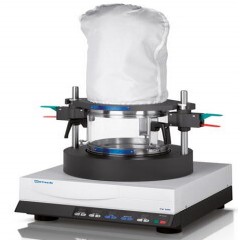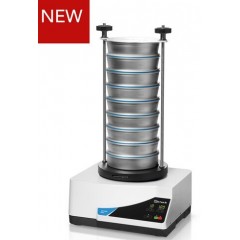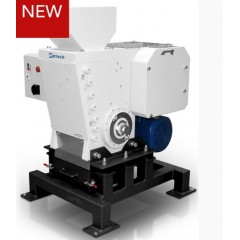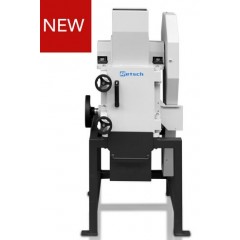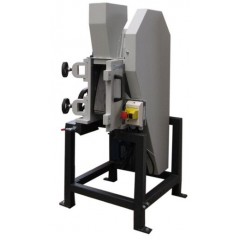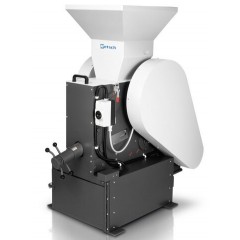detailed overview and knowledge of the characteristics of a raw
material is of utmost importance, especially when planning the layout of
a crushing plant. In order to minimize all possible risks extensive
trials are necessary to obtain information on the properties of the raw
materials . A clear definition of the required crushing capacities and
the desired product quality can be precisely determined by using the
Bond Index test methods. Using the Bond Index test procedures it is
possible to calculate crushing / abrasion behavior of mineral samples.
This knowledge is essential to define the required ball mill layout and
production capacity.
In order to perform the Bond Index Test successfully it is necessary to use pre-crushed sample material as defined below:
Module Ball Mill
Minerals pre-crushed to < 3.35 mm and sieved
Drillcore pre-crushed to < 3.35 mm and sieved
Half Drillcore pre-crushed to < 3.35 mm and sieved
The Bond Index conforming ball charge consists of:
43 x 1.45” balls
67 x 1.17” balls
10 x 1” balls
71 x 0.75” balls
94 x 0.61” balls
The optimum number of grinding balls is 285. However, the ball diameters
vary due to wear. Therefore, the total ball number should be adjusted
from time to time to ensure a total mass of 20.125 grams.
The grinding jar of the Bond Index Ball Mill measures 12″ x 12″ and has well-rounded corners.
Module Rod Mill
Minerals pre-crushed to < 12.50 mm and sieved
Drillcore pre-crushed to < 12.50 mm and sieved
Half a drillcore pre-crushed to < 12.50 mm and sieved
The Bond Index conforming rod charge consists of:
The grinding jar for the Bond Index Rod Mill is 12″ x 24″ in size and has a wave-shaped design.
At
least 15 to 20 kg sample material is required to simulate a closed
grinding circuit in a ball or rod mill. The Rod Mill Work Index (RWI)
is used for particle size determination in a size range from 25 mm down
to 2.1 mm whereas Ball Mill Work Index (BWI) is used for the range from
2.1 mm down to 100 µm.
Adjustment of grinding parameters:
The
operation display permits convenient selection and storage of
parameters such as rotation counter, rotation speed, grinding time,
start and stop.
优点
适合定义功指数
可选球磨和棒磨
易倾斜空鼓
固体钢铁结构
可移动样品收集装置
便捷的数据显示
带手柄漏斗
符合人体工学的导轨利于移除研磨罐
分离网格将样品和研磨球分开(仅限研磨球)
带垫片研磨罐用于无损耗操作
固体防噪音罩带安全开关
紧急开关
性能指标
| 应用 | 矿石和矿物质量化的易磨性 |
| 应用领域 | 地质 / 冶金, 建筑原料, 环境 / 资源回收利用 |
| 样品特征 | 硬的, 脆性的 |
| 粉碎原理: | friction |
| **进样尺寸 | < 3.35 mm 球模块 / 12.50 mm 棒模块 |
| *终出料粒度 * | < 100 µm with ball module / 2,100 µm with rod module |
| 批次加料量* | *小15 kg带球模块 / *小 20 kg 杆模块 |
| 旋转速度 | 70 min-1 球模块 / 46 min-1 棒模块 |
| 研磨平台数 (可接纳研磨罐数) | 1 |
| 研磨套件材料: | 硬质刚 |
| 研磨罐尺寸 | 21.7 l 球模块 / 43.3 l 棒模块 |
| 粉碎时间设定 | 数字模式 |
| 驱动功率 | 0.75 kW |
| 电源数据: | 不同电压 |
| 电源接头: | 单相 |
| 防护类型 | IP 50 |
| 机体尺寸(宽x高x纵深) | 1500 x 1200 x 700 mm |
| 净重 | ~ 295 kg |
| 标准 | CE |
Please note:
受样品材料性质和仪器配置/设定的影响
作用原理
球和棒磨机主要有相同的概念包括一个12 x12“带球的罐或12 x24 ”罐和研磨棒。
研磨罐放到一个电机驱动旋转的支架,有三种摆放方式::向上加载,水平研磨,向下排出。
进行邦德功指数测试需要用到已知的研磨球或研磨棒,电子控制集成的驱动器配有过载保护和许可和控制不同的速度。
在磨削过程中球/棒运动和研磨罐的速度差产生相互作用和影响的摩擦力,释放出所需的粉碎能量。这些力量之间的相互作用产生有力的粉碎效果。
根据技术改造和误差调整
 高级会员
高级会员 已认证
已认证